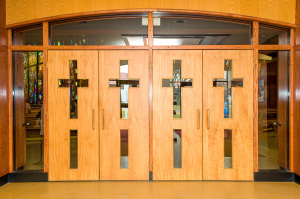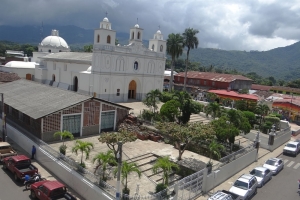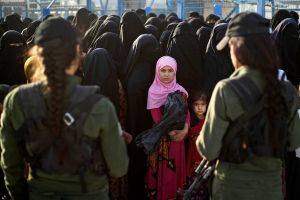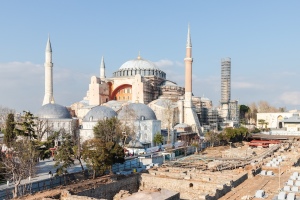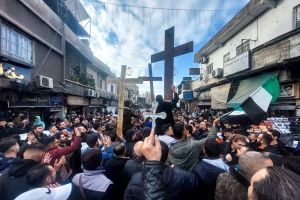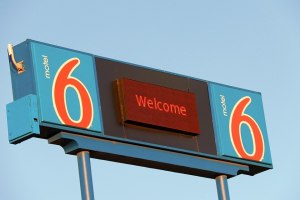Ecumenical Delegation to U.S. Wraps Up Sudan Awareness Visit
An ecumenical delegation from Sudan concluded its tour through the United States on Friday after 12 days of raising awareness on the situation in Africa's largest nation, which may soon be divided into two.
In addition to church appearances and meetings with U.S. ecumenical leaders, the delegation participated in discussions with U.N. officials, a forum at the Council on Foreign Relations in New York City, and meetings with U.S. State Department officials in Washington.
The main message the delegation delivered was this: "Now is the time for the church community in the United States – and the world – to raise its voice in solidarity with the people of southern Sudan as they move closer to an important referendum in the North Africa nation."
And for delegation members, the idea that the Church – and the international community – should speak forcefully to encourage a free and fair referendum is not just a humanitarian gesture but a gospel imperative.
"People have been suffering, people are oppressed, people are not treated as true human beings. They say they are treated like second-class citizens by Sudan and this must come to an end," said the Rev. Dr. Sam Kobia, Sudan envoy for the All Africa Conference of Churches and former general secretary of the World Council of Churches.
"It is in keeping with the Gospel of Jesus Christ," the ecumenical Methodist from Kenya added.
For over six decades now, people in southern Sudan have been holding to their identity even after the British-organized Juba Conference in 1947 combined the Arab and Muslim North and Christian-Animist South into one political entity.
"The colonial administration drew the boundaries … they already knew the south was objecting to that kind of unity," said Roman Catholic Bishop Daniel Adwok, one of the members of the ecumenical delegation, during an interview Wednesday with the Episcopal News Service in Washington.
"The South has never accepted the unity; Sudan has never been a united country," he added.
And when the government in the North launched an effort to impose Islamic law on the South in the early 1980s, the fighting took a turn for the worse. Civil conflicts and ongoing political and military violence wracked Sudan from that time until 2005, when the Comprehensive Peace Agreement (CPA) was signed by the two warring parties – the Sudan People's Liberation Movement in the South and the north's Khartoum-based Government of Sudan in the North.
Under the terms of the CPA, a government of national unity was to be formed for a transitional period of six years, during which the South would be autonomous. At the end of the six-year period, a referendum would be held on Jan. 9, 2011, on the issue of a unified Sudan or secession of the South.
Though signing of the CPA effectively put an end to the more than two decades of violent civil war, many say a return to violence is becoming increasingly likely as preparations for the referendum are well behind schedule. Sudan's defense minister warned this past Tuesday that the referendum on southern independence could be delayed if the country's North and South cannot resolve issues such as borders, sharing oil revenues and who is eligible to vote.
Defense Minister Gen. Abdul-Rahim Hussein told reporters after a meeting in Cairo with Egyptian President Hosni Mubarak that the vote must be based on clearly defined borders and presently 20 percent of the North-South boundary has not been decided yet.
If the key issues remain unresolved, "logic and reality" suggest the referendum be delayed, he stated.
Southern Sudanese leaders, however, have rejected any talk of delaying the vote and vowed to hold the referendum unilaterally if the North does not cooperate.
"You have signed a comprehensive agreement. You have been given a chance to make it workable. You cannot come at this moment and say it's not workable," chimed ecumenical delegation member Daniel Deng Bul, Archbishop of the Episcopal Church of Sudan, to ENS on Wednesday.
Hussein, in response to similar remarks, has warned that a unilateral declaration of independence by the south would be "illegal."
With tensions running high, the ecumenical delegation made its rounds over the past two weeks, urging support from the U.S. faith community. Religious leaders in the multi-religious south have already picked up support from a number of prominent faith-based organizations, including the World Evangelical Alliance.
"The world church, when it comes together, is a formidable source," explained Kobia.
"From their vantage point this is one of the most critical and urgent global issues of our times," added the Rev. John L. McCullough, executive director and CEO of Church World Service, who joined the delegation in urging American churches to raise their voices "in places of power and policy."
Even the Obama administration says it is making Sudan a priority despite a host of domestic woes and political elections in less than two weeks.
Administration officials said in a briefing Friday that the White House is holding at least three meetings a week on Sudan as it tries to avoid a new outbreak of violence. And the president is reportedly getting daily briefings on the situation.
"This is a rare case in which the United States and other international players are teaming up to shine a spotlight on events on the ground proactively ahead of an event," reported Samantha Power, a senior foreign policy adviser to President Obama.
Notably, just 79 days remain before the promised referendum that could officially split Africa's largest country in two.
The referendum is the final provision of Sudan's CPA. In addition to the referendum, the CPA also calls for equal oil revenue sharing between North and South (oil revenues account for 95 percent of Sudanese export revenues and 65 percent of government revenues, according to the International Monetary Fund); fair demarcation of North-South boundaries; and resolution of citizenship issues.
Many analysts expect the South to vote to secede in the upcoming referendum. It is uncertain, however, how the North will react should the South vote to split.
Earlier this month, Sudanese President Omar al-Bashir warned that the Khartoum-based government "will not accept an alternative to unity" despite its "commitment" to the CPA. Southern Sudanese President Salva Kiir, meanwhile, has asked members of the U.N. Security Council to deploy U.N. peacekeepers along the border to ease tensions as the vote nears.
Kiir said any delay on the referendum would cause a return to violence "on a massive scale."
















